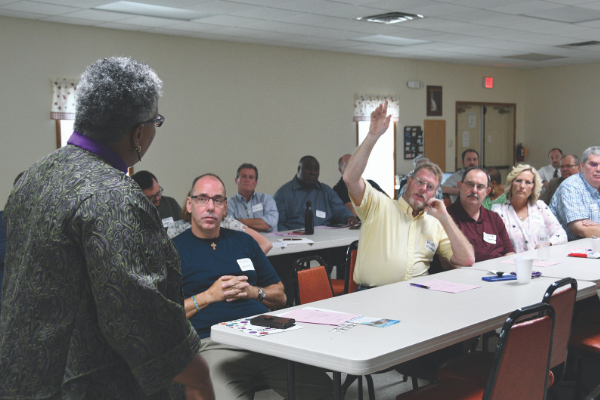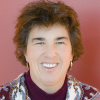Bishop holds listening tour across BWC

Full-time Local Pastor Rob Pierson raises his hand to ask Bishop LaTrelle
Easterling a question during a Q & A at Parkhead UMC in Big Pool.
More than 1,000 people gathered in district meetings this fall to be in conversation with Bishop LaTrelle Easterling about the state of the church and the future focus of the Baltimore-Washington Conference.
Bishop Easterling outlined six foci that will drive the efforts and resources of the Conference as it seeks to live out its vision that “Transformed Lives Transform Lives.”
The foci include:
- Deepening Discipleship;
- Strengthening Next-Level Leaders;
- Creating New Faith Expressions;
- Generating Generosity;
- Getting and Staying Healthy; and
- Engaging Young People in Ministry.
The first priority, the bishop said, is deepening discipleship. “How did you die today?” she asked, quoting theologian Cornell West. “What thoughts or behavior did you lay aside? How have you been broken open? What have we been taught that we need to disabuse ourselves of ? How did we let go of some lesser understanding?”
She encouraged every member of the Baltimore-Washington Conference to intentionally grow deeper in their faith.
One resource to assist with this, she said, is the new online Bible Study “Who Are We: A Journey from Head to Heart.” This 18-week study, divided into three, six-week parts, explores who are we are as a people of God, as United Methodists, and the people of the Baltimore-Washington Conference.
Despite struggles in the denomination, God is still calling United Methodists to mission and ministry, Easterling said. Strengthening next-level leaders and ensuring that “we learn well today to lead better tomorrow,” is important.
To resource people for this goal, the Connect Leadership Summit, an inaugural event that replaces the former Leadership Days, will be held March 7 in the Baltimore and Washington regions and March 14 in the Southern and Western regions. Its aim is “inspiring and equipping churches to connect more people to Jesus,” said the Rev. Rodney Smothers, director of leadership and congregational development.
Plans for a comprehensive Leadership Academy, for people identified by their district superintendents, will also be launched in 2020.
Growth in discipleship is also expected to come in the BWC’s new ministry focus: New Faith Expressions. The purpose of these, explained the Rev. Bill Brown, director of New Faith Expressions, is “to bring the church Jesus loves closer to the people Jesus loves.
Brown asked those present to think about their churches and consider two questions: “Who are you not reaching because the only thing you offer is church as you know it?” And, “what are you willing to let go of in order to follow Jesus?”
New Faith Expressions, he said, will “equip and encourage change so change-makers can gather new people in new places.”
Generating Generosity, strengthening revenue streams and finding creative sources and partnerships for ministry is also a conference focus. The bishop encouraged all leaders to be tithing. “We’re living beneath the dignity of leading God’s people if we’re not tithing,” she said.
Strengthening the finances of the conference will enable new ministries, she said, such as a Pastor’s Aid Fund, which can provide money for clergy in need.
“The pain and weight and burden some of our clergy our carrying in this season in United Methodism is affecting them to the point that they’re ending up in the hospital. We want to be able to assist them; that’s how we love each other, that’s how we’re in community with each other,” the bishop said. “The healthier we are in mind, body and spirit, the more we’re able to focus on mission and ministry. The more present we are, the better we can serve people. Additional revenue can undergird things like that. We want it to be a deep well.”
On a related note, the bishop warned against “weaponizing stewardship” because of theological or polity differences with the denomination.
“We rob God when we withhold our tithes and offerings,” the bishop said. “Ceasing to give points to a serious issue in the relationship between you and God. I pray that we will not withhold giving based on what we think is right or wrong. I pray that we are faithful stewards with all that God has given us.”
Getting and staying healthy is also a missional priority for the conference. Denominational officials have shared that some of the highest rates of depression among clergy are in the Baltimore-Washington Conference.
“We need to take better care of ourselves,” the bishop said.
Bishop Easterling also stressed the need to focus intentionally on people under the age of 35. “The faith that some of our youth and young adults already have is unbelievable,” she said.
The conference is working on a comprehensive plan that will ensure that young people are “no longer recipients of ministry, but agents of ministry,” said Director of Connectional Ministries Christie Latona. (Learn more at www.bwcumc.org/ministries/ young-peoples-ministries.) Parts of the plan have already been implemented to great success. The campus ministry at the University of Maryland, for example, has doubled the number of students participating.
To help the BWC address these six priorities, Bishop Easterling and conference leaders will be working to help the church “grow by shrinking. We have too many places of worship that have a sign out front that says ‘United Methodist Church’ but are no longer being the church. They’re just being community for one another,” she said. “My hope is to have 100 percent at 100 percent by 2020.”
It may take until 2024, the bishop admitted, but she is committed to having 100 percent vital, engaged churches in the conference. For some churches that might mean creating a legacy and closing; for others, it may mean a vital merger.
“In some instances, we may need to prune to grow,” the bishop said. “Discipleship is active.”
Several people present at the gatherings raised questions about the denomination’s future as it figures out how to address issues of homosexuality. Bishop Easterling cautioned people to remain faithful.
“We don’t need bad attitudes infecting us. We don’t need poor practices, nor divisions,” she said. “I don’t want us to keep rehearsing where we don’t agree. We can do mission and ministry across our division.”
For those looking for a way to move forward in the face of worries related to General Conference 2020, the bishop advised:
- Seek out information and be informed, remembering always that it is God who is in control, not us;
- Understand that nothing moves quickly within the institution of The United Methodist Church;
- Have conversation, pray, be open to the movement of the Holy Spirit;
- Stay active in mission and ministry; and
- While we’re doing these, and other things, continue to be the people of God called us to be.
At the district sessions, the bishop fielded more than 18 hours of questions that ranged from the scope of training for lay servants and certified lay ministers, to questions about Camp Joy, the important role deacons play in the church, the superintendents’ role as missional strategists on their districts, best practices for community engagement, gentrification, the hermeneutics of suspicion, the necessity of prayer, the Trust Clause, and keeping sabbath.
Bishop Easterling will conclude her visits on the districts on Nov. 19 in Reisterstown and Dec. 10 in Catonsville.


I am thankful for Bishop Easterling's leadership and vision for the growth of discipleship in our conference. It is very exciting to focus on the 6 areas she outlines, and I pray for a fulfilling journey for us together as we make disciples for the transformation of the world.
Addressing the LGBTQIA+ issue need not cause us to lose faith. Indeed, the issue and the various unreconciled positions and perspectives on it may confuse people and may cause them to lose faith: As we seek to make disciples, the world we encounter is watching us to discover what kind of people we are, what kind of believers we are, and what kind of denomination we constitute. LGBTQIA+ is an issue in today's world, and we need to have an approach to it.
Paul encouraged the Philippians to be like-minded, have the same love, and to be one in spirit and of one mind. How will we do this on the LGBTQIA+ question? Without presuming the answer or resolution, can we prayerfully consider this? Is it possible to have holy conversations about this? Are there models for holy conversations on this?
It's now possible for LGBTQIA+ brothers and sisters to grow up within and become disciples in our denomination but be denied the sacrament of marriage and be denied entrance into the ministry. This sort of rejection causes people to lose faith. While things may move slow in our denomination, let's not forget that life moves on, people move on, and the Gospel moves on. Will we miss it? Will we miss them? I hope not.